Gut microbiota in patients with Alzheimer's disease spectrum: a systematic review and meta-analysis
- PMID: 35027502
- PMCID: PMC8791218
- DOI: 10.18632/aging.203826
Gut microbiota in patients with Alzheimer's disease spectrum: a systematic review and meta-analysis
Abstract
Context: Gut dysbiosis has been proposed as one of pathologies in patients with Alzheimer's disease (AD) spectrum. Despite such enthusiasm, the relevant results remain substantially controversial.
Objective: A systematic review and meta-analysis were performed to investigate the differences of gut microbiota (GM) between patients with AD spectrum (including mild cognitive impairment [MCI] and AD) and healthy controls (HC).
Data sources: PubMed, MEDLINE, Scopus, and Cochrane Library from January 2000 to August 2021. Eligibility criteria for study selection: Observational trials and pre-intervention data of intervention trials that investigated the abundance of GM in patients with AD spectrum and HC.
Data extraction and synthesis: Two reviewers independently identified articles, extracted data, and evaluated the risk of bias. The effect sizes were performed by a random-effect, inverse-variance weighted model. The effects of different countries and of clinical stages on GM abundance were also examined.
Results: 11 studies consisting of 378 HC and 427 patients with AD spectrum were included in the meta-analysis. Patients with AD, but not MCI, showed significantly reduced GM diversity as compared to HC. We also found more abundance of Proteobacteria, Bifidobacterium and Phascolarctobacterium, but less abundance of Firmicutes, Clostridiaceae, Lachnospiraceae and Rikenellaceae in patients with AD spectrum as compared with HC. The profiles of abundance of Alistipes and Bacteroides in HC and AD spectrum were differentially affected by countries. Finally, when considering clinical stage as a moderator, the comparisons of abundance in Clostridiaceae and Phascolarctobacterium showed large effect sizes, with gradient changes from MCI to AD stage.
Limitations: The inclusion of studies originating only from China and the U.S. was a possible limitation.
Conclusions: Patients with AD spectrum demonstrated altered GM abundance, which was differentially mediated by countries and clinical stages.
Keywords: Alzheimer’s disease; dysbiosis; gut microbiota; meta-analysis; mild cognitive impairment; systematic review.
Conflict of interest statement
Figures

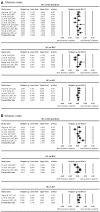
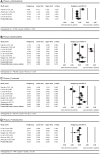
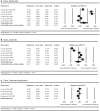

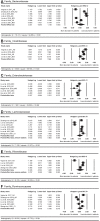
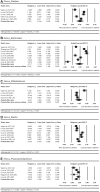
References
-
- Dubois B, Hampel H, Feldman HH, Scheltens P, Aisen P, Andrieu S, Bakardjian H, Benali H, Bertram L, Blennow K, Broich K, Cavedo E, Crutch S, et al., and Proceedings of the Meeting of the International Working Group (IWG) and the American Alzheimer's Association on “The Preclinical State of AD”; July 23, 2015; Washington DC, USA. Preclinical Alzheimer's disease: Definition, natural history, and diagnostic criteria. Alzheimers Dement. 2016; 12:292–323. 10.1016/j.jalz.2016.02.002 - DOI - PMC - PubMed
-
- Zhang ZH, Wu QY, Zheng R, Chen C, Chen Y, Liu Q, Hoffmann PR, Ni JZ, Song GL. Selenomethionine Mitigates Cognitive Decline by Targeting Both Tau Hyperphosphorylation and Autophagic Clearance in an Alzheimer's Disease Mouse Model. J Neurosci. 2017; 37:2449–62. 10.1523/JNEUROSCI.3229-16.2017 - DOI - PMC - PubMed
-
- Bonfili L, Cecarini V, Cuccioloni M, Angeletti M, Berardi S, Scarpona S, Rossi G, Eleuteri AM. SLAB51 Probiotic Formulation Activates SIRT1 Pathway Promoting Antioxidant and Neuroprotective Effects in an AD Mouse Model. Mol Neurobiol. 2018; 55:7987–8000. 10.1007/s12035-018-0973-4 - DOI - PMC - PubMed
Publication types
MeSH terms
LinkOut - more resources
Full Text Sources
Medical

